|
It goes without saying that David is an accomplished musician on several instruments. I found him to be an excellent and responsive teacher as well. I started off thinking I would reconnect with the piano through lessons, but quickly discovered that my heart was no longer in playing a solo instrument. I asked David if he would help me with ear training instead, as I am singing in several amateur choirs. Although he was clear that he is not a voice coach, he has an excellent ear and agreed to this change in direction. He came to each session prepared with something new to work with, including some apps I could use on my phone to build my skills. He created an environment in which I felt comfortable to sing alone and make mistakes. We used my choir materials to explore some theory concepts, but he also surprised me with his own exercises. In the end, I feel more confident. I grew musically with his help and encouragement. His tutelage will allow me to enjoy my choir singing more. Thank you David!
NL MacDonald 2024 Thank you, Nona.
0 Comments
Just fiddling around
1. Fiddle dee dee Heather Lotherington I took up the violin in my 60s. It was early summer, 2018, shortly after my daughter had taken me to task on a constant refrain that my next car would be a Porsche. On my birthday, she met me at a Porsche dealership and insisted the two of us test drive the car of my dreams. Midway out of the lot, the exquisite sports car’s battery went flat, and we drifted into traffic. It was horrifying—but a dramatic lesson. Life waits for no one. (I bought an Audi TT instead). When my husband suggested a lovely gift idea for my birthday, I declined and asked for violin lessons. Soon after, I had a rental violin in hand, and a month’s lessons lined up with a local teacher, who I found online. And thus began my violin journey. I remember my first lesson: I had no idea how to hold the violin or the bow or that I needed a shoulder stand to help position the violin more comfortably on my shoulder. I didn’t even know how to pick up my instrument. It was a very cold start. I reckoned that playing the violin—an idea in the back of my mind for some time—might help stem my arthritis and encourage some flexibility in my increasingly knobby, stiff fingers. This wasn’t the primary motivation for learning, but it did help to spur me along. I had put off my dream of playing the fiddle for long enough. If I didn’t get going, my hands were going to become inflexible claws. Plus, how hard could it be? The fiddle is commonly played by countryfolk by ear, and you see even little children wailing away on violins. Fast forward past the commitment of buying a violin and a sustained period of caterwauling that caught the attention of local tomcats, past the perpetual state of terror at lessons, a badly inflamed shoulder, unending frustration, and constant tweaking of violin, shoulder rest, chin rest, bow to find a position where my instrument felt even quasi-comfortable. It would be lovely to sugarcoat just how miserably trying this beginning period was. It was by sheer dogged determination that I survived. My bowing was crooked (it looked straight to me, but such is parallax), sliding towards the fingerboard, which created an awful tone. My bow (right) elbow was all over the map instead of steadily in position for the string being played, so I “string-crossed,” or hit more than one string at one time. This can be done by design; mine wasn’t. (Think donkey braying noises.) My bow bounced off the string when I lowered it to play. I could only reach the top two strings (E, A) with my left (violin) hand and I had absolutely no idea how violinists got all twisted around to reach much less play the D string and the bottom (G) string. My left shoulder and back ached to the point where I had to stop entirely for a few months and get physiotherapy to repair the tense, weak, underused muscles I needed to build. So, the first hurdles were painfully physical. My teacher, Lucia, was understanding. “No one is born playing the violin,” she would say. There was a learning curve just to holding the instrument. But there was also a focus hurdle. I wanted to learn to play the instrument, and my teacher did her best to guide me. On her advice, I bought a learner book. But my agenda was vague and unhurried. I would practice the same songs again and again, and sound just as bad as the last time I played them. I was mystified how violinists found the exact notes on an unfretted instrument when there seemed to be so much room for error. Practice was demotivating to say the least. After several months, I could feel my teacher’s impatience as she tried to move me ahead in my learner book to attempt a simple jig. I crumbled. I couldn’t tell where those high notes were and jumping up two strings from the D, which I could finally reach, was taxing. I would practice and hate every moment. And then Covid-19 hit and life came to a grinding halt. I stopped playing. Looking back, I now see two glaring problems I faced during that first unproductive period:
I was horribly disillusioned. Monitoring my increasing disheartenment at plowing through my beginner book, my husband made a sensible, informed suggestion: sign up for an examinable music program. So I did. Learning to play a musical instrument, even at an elementary level, is going to take effort and persistence. Any activity that helps you to maintain your enthusiasm should be welcomed. Here are five ways I assist myself. You might think up your own list.
Both programs and institutions were similar in size, scope, and intent. They had similar goals of producing professional musicians and skilled teachers.
At Berklee I studied jazz composition, a creative and primarily cerebral affair. The music courses were interesting but not too challenging. In contrast, the Royal Conservatory of Music (RCM) was a full on physical experience that challenged my endurance, courage, and self-image. At Berklee I excelled easily because I came to the experience with considerable professional experience behind me. Classical piano on the other hand was a new disciplined practice that I had no experience or preparation for. A Berklee I was trained to be an employable musician and its skills still work. At Berklee, creative wondering was encouraged. This lead to all sorts of self indulgent activities. However, at the RCM I was challenged not to be "creative" but to be skilled and competent. At the RCM I decided for the first time in my educational life to simply follow directions, do what I was told, and see what happens. The result of all this obedience? I really learned how to play the piano beautifully and realise my potential both as a player and teacher. Being "creative" is easy if you use yourself as a reference for judging the output. But, playing beautifully according to independent assessment of a jury is not easy. So, Berklee was easy, the RCM not at all. If you would like help preparing for either experience, call me. David Zoom whiteboard notes from a piano student's lesson A student asked me questions on practicing. Do I practice every day, how long do I practice, when do I practice, what do I practice? How do I keep my enthusiasm for drumming year after year? Here are my answers.
As many people know, I took up the drums at age 50 after an adult student challenged me by saying I had no idea how difficult it was to learn as an older adult. I took the challenge. So, this blog is about my percussion practicing. (When my musical colleagues ask why I started drumming I tell a more colourful story that involves my misperception that drumming would be a cheaper mid-life crisis solution than buying a red sports car.)
If I can help and encourage you on your musical journey, call me. David aka "sticks Story" PS. I now cart my drums around in a red Cadillac. Not quite a sports car, but more drummer friendly. How much practice, time, and effort did earning my Royal Conservatory Level 10 and ARCT Pedagogy diploma take?
I teach many retired professionals. Some are lapsed musicians; others are just starting out their piano journey. All of them are keen. To help out, I've taken notes of some of the characteristics of my successful students.
If I can help you with your dream of playing the piano, call me. David I wish these apps had been available when I started playing piano as I was not a gifted ear player. In fact, I struggled. On top of this my teachers didn't stress aural development either because they were readers first. So, my development was glacial. Thankfully, things have changed.
How did I develop my aural skills? In college I was given proper ear training. Later, I took up the drums, learned countless tunes by ear, and wrote them down. For the last decade I've been teaching online where I don't always see students' hands clearly. My ear has learned to hear individual notes out of place. If I can help you, call me. David revised 2024 What an exciting time of learning. I was able to experience live coding, VR sound, Ai developments in musical education and more under the direction of young and exciting researchers. It was just what an old goat needed, some fresh ideas. One thing that did strike me was how dated the synthesizer music was. The young musicians were in the thrall of the 1990s. That took me by surprise. The walk from downtown to Napier University was lovely and peaceful.
I've been attending concerts for over half a century. That's a lot of concerts. Many have been completely forgotten, a few others can be recalled with some sort of prompt, and a small number remained seared in my mind. I counted seven concerts that changed me in some significant way. Here's the story of those concerts.
David 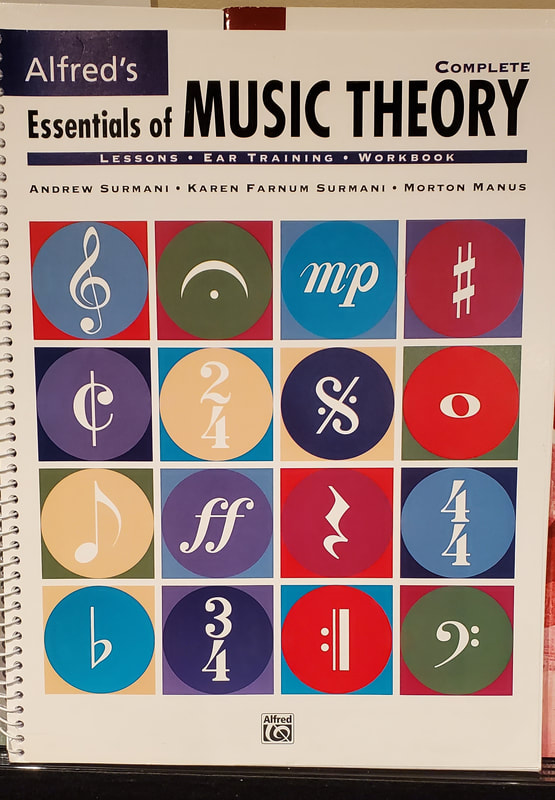 "I have been a student with David for the past couple of years. While my primary instrument is Trumpet, I decided to take piano to broaden my knowledge. I have never had music theory, either in school or private lessons. David is taking me there through the piano. He assured me that all the skills I would learn through theory and practice on the piano were transferable to other instruments. David has a way of simplifying theory concepts, making them easier to understand. I had an opportunity to play Trumpet at a private service recently. Playing completely solo - no other musicians. One piece happened to be the one David and I were working on. Everything we had done came into “play” and those skills I have learned completely transferred to my Trumpet and I played the best I have ever played. When you ask yourself, “Do I really need to know this?” I can honestly say, Yes! and it pays off in performance quality." Barb Thank you, Barb. A New Student's Profile
The new student is a young professional with a keen interest in learning to play jazz piano. They took piano and trumpet lessons in high school. They have a basic understanding of music theory. Aural skills are excellent. Their program will include the following components:
David I'm finishing my first year with the Toronto Concert Band and what a thrill it has been. From drum set to piano, xylophone to tympani it has been a journey of intense rehearsal, thrilling concerts, private practice, and fellowship.
At the upcoming concert I will be playing:
Come join us and say hi after the concert. When: June 10, 2023 @ 7:30 pm – 9:30 pm Where: Glenn Gould Studio, 250 Front Street West Tickets: 2023 Spring Concert - Toronto Concert Band Angela Hewitt shares her tactics, strategies, and stories on how she keeps her musical memory strong. It is interesting to note that musical conservatories, like the Royal Conservatory of Music in Toronto, have developed curriculums that prepare the ground for developing and maintaining musical memory.
Link to the article: ‘Like sex and religion, we don’t like to talk about memory’: pianist Angela Hewitt on how she keeps hers in shape | Classical music | The Guardian The teacher practices Jazz Last weekend I went to my first jazz jam with my Vibraphone aka my Malletkat GS Grand. We were a quartet of Tenor Sax/Flute, Vibes, Bass, and Drums. I survived with my dignity intact, but I’ve a few discoveries and confessions to share.
On the plus side, I knew all the tunes from years of playing and teaching jazz piano plus my jazz time and feel is strong. Here is the practice regime I began to follow to improve my jazz experience. Tune: Satin Doll by Ellington/Strayhorn
If I can help you with your jazz piano journey, call me. David BTW: In the era of Ai content generation, a human wrote this blog.
This week an adult student came to class in a state of agitation. They were frustrated that they didn't have time this week to practice, and they felt embarrassed.
Five things to consider.
I said, "John, think of this hour as an oasis without responsibilities". That worked, he had a fun lesson. He even sent a thank you email after class. David From whiteboard notes and exercises I sent to students this week. David Super video demonstration but...
Let's consider the assumptions he is making about you the student/listener.
What is my job? I prepare students to understand and execute what he is talking about. The first thing we will do is assess your situation and then we'll draw up a logical plan.
Call me, David BTW: in 2017, I studied with Peter Martin in Rome Italy at the ROMA Jazz Workshop. I was in Rome studying jazz drumming with Greg Hutchinson. Greg played in Ray Brown’s last group. Peter is a great guy and a very skilled musician. When I grow up, I want to play piano like him. Updated 2024 Tonight, in concert band we will sightreading 8 to 10 new pieces of music that arrived last night and this morning. I am following this protocol to be ready.
1. I immediately printed the music. 2. I created a new YouTube playlist of the pieces. 3. I studied the scores while listening to the musical recordings. I made note of the tricky bits. I did not necessarily listen all the way through, just enough to get a sense of the part. 4. I put aside all the music I can easily sightread. It will be read for the first time tonight. 5. I have made note of the tricky bits in the three remaining pieces: one measure in one piece, one section in another, and then put the third on the music rack for immediate attention later this morning. 6. I wrote in the stickings on the two easier pieces in the trickly passages. 7. I am preparing to practice the one tricky piece with my pencil, eraser, recording, drumkit, music ready at hand. I will let you know how it turns out tonight. David 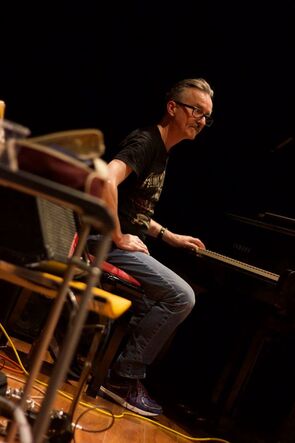 I started part-time teaching in 1982 and in 2007 I went full-time. That is a few generations of students that have passed through my studio. What have I learned?
If I can help you get started, call me. David Another day in the teaching studio and another diverse set of pieces. Someone stated that an average piano teacher teaches 600+ titles a year. I believe it.
Up next: Music rehearsal with my friends, the pianist Jim Finlayson and bassist Rory Slater. I'll be drumming. We've been meeting every 2 weeks for years. It is always a highlight of my week playing tunes from the "Great American Songbook". Lots of Porter, Corea, Hancock, and Ellington. Back to class 7. Prelude in Db by Glière 8. Fantasia in D minor K397 by Mozart 9. Pumpkin boogie by Faber 10. Sonatina in C by Faber 11. Drum rudimental warmups 12. Never Going To Give You Up by Rick Ashley 13. Theory class RCM 8 and Band Lab DAW Now to the drummers 14. Video game music 15. 3/4 Scottish snare drum solo 16. Free Fallin' by Tom Petty 17. Rollin' in the deep by Adele 18. Superstition by Stevie Wonder Revised August 2022 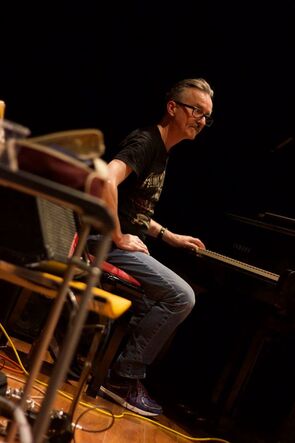 Another day of teaching piano and drum set comes to an end. Here is today’s student repertoire. Marching by Kabalevsky Skating Waltz by Berlin Love Me Tender by Elvis Claire de Lune by Debussy Les Baricades Misterieuses by Couperin Chitlin’s Con Carne by Burrell Etudes by Scriabin Prelude and Fugue in Bb by Bach Clementi Etude in E by Clementi Serenade by Haberbier Cancion by Mompou Cottontail by Ellington Kamado Tanjiro no Uta by Shiina and Ufotable Watermelon Man by Hancock Haunted mouse by Faber and Faber Forest Drums by Faber and Faber Dinah by Fats Waller Never Going to Give you up by Ashley Street of Dreams by Ella Scottish ¾ March It’s Only A Paper Moon by Nat King Cole Meditation by Jobim Night train by Forrest Time for a beer. Revised August 2022 I spent the summer of 2001 making music on the Mediterranean near Santa Pola, Spain in a small apartment overlooking the sea. I fondly remember the sun, the heat, the paella, the wine, the flowers, and the nightly walks along the seaside promenade.
Now to the story. I had had big plans of dragging my portable piano to Spain. At the check-in counter in Toronto the agent promptly rejected the piano in the lovely crate I had built. The airline won’t let me check it as baggage because they said it was as big and heavy as a coffin. Dejected I sent it home in an in-law’s car trunk. As luck would have it, I had another in-law in Spain with an old unused Casio keyboard of sixty-five keys, one pedal, a stand, and books of Bach and Chopin. I set up that keyboard in a window with the ocean view. Then I started playing during the long afternoon siestas. Bach, Chopin, and I quickly fell in love. Apparently so did my new neighbors who, unbeknownst to me, heard me practicing hours on end through that open window. Back in Canada I started asking about for a “Classical” piano teacher. A professor from McMaster University recommended Leon Karan. I set up a lesson. It didn’t go well. I banged through some scales and thumped out my Bach. Though I was embarrased and humiliated, Leon was kind. After I recovered, he said, “you are of course going to do your ARCT?” “I am?” Five thousand hours later I earned an ARCT diploma in piano pedagogy and won a national scholarship. Thank you, Leon, for your patience. You changed my life. David Revised August 2022 I've fond memories of listening to New Orleans Jazz as a kid at home. Al Hirt, Louis Armstrong, Pete Fountain, the lot. Music that gives joy when you play it. and joy when you listen to it. "Sugar" was released in 1926 by Ethel Waters, you can listen below. Over the Christmas break, I've been learning to play jazz on the xylophone. Who knew it was so much fun? This is my version on xylophone with piano accompaniment. If you would like to have as much fun as this on the piano, call me. David Revised August 2022
|
You've got to learn your instrument. Then, you practice, practice, practice. And then, when you finally get up there on the bandstand, forget all that and just wail. AuthorI'm a professional pianist and music educator in West Toronto Ontario. I'm also a devoted percussionist and drum teacher. Categories
All
|
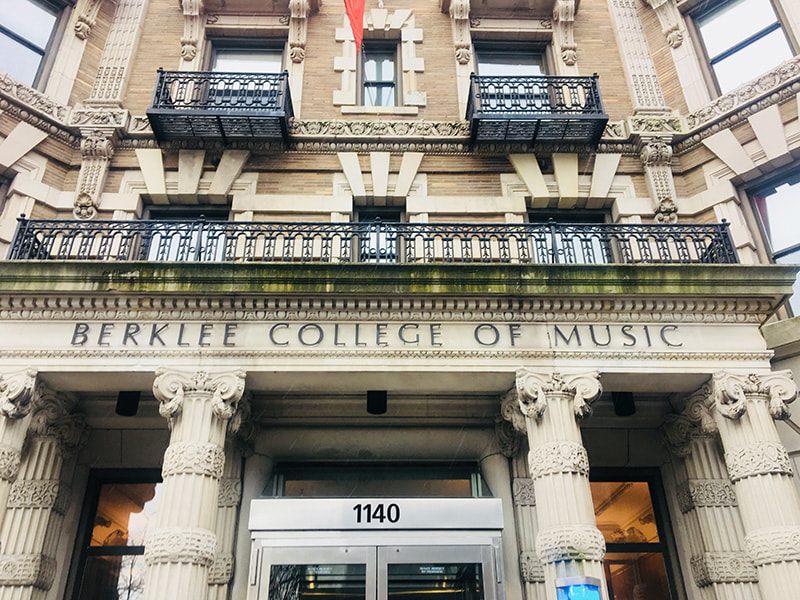
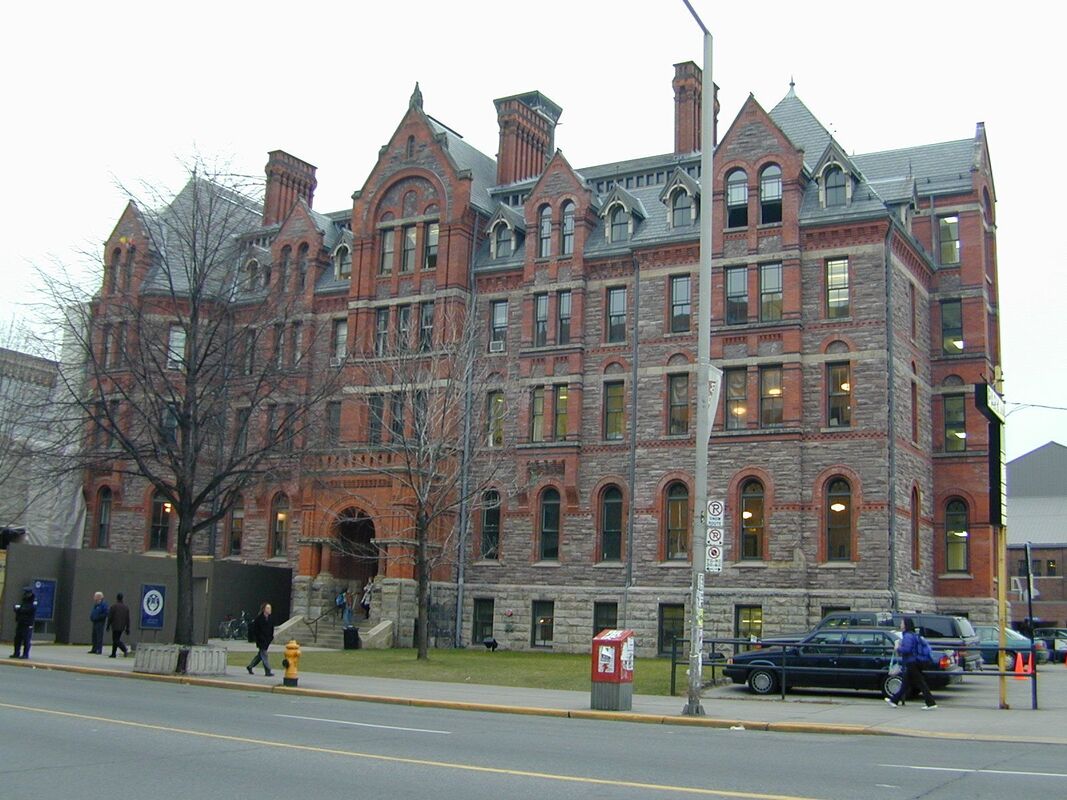
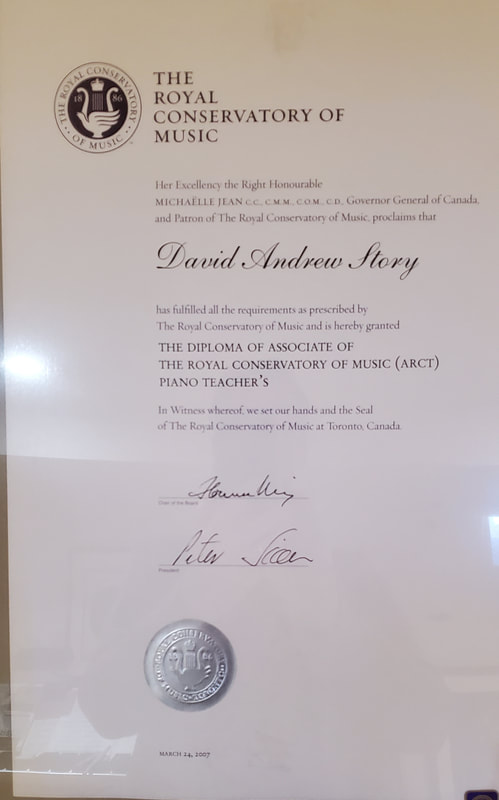
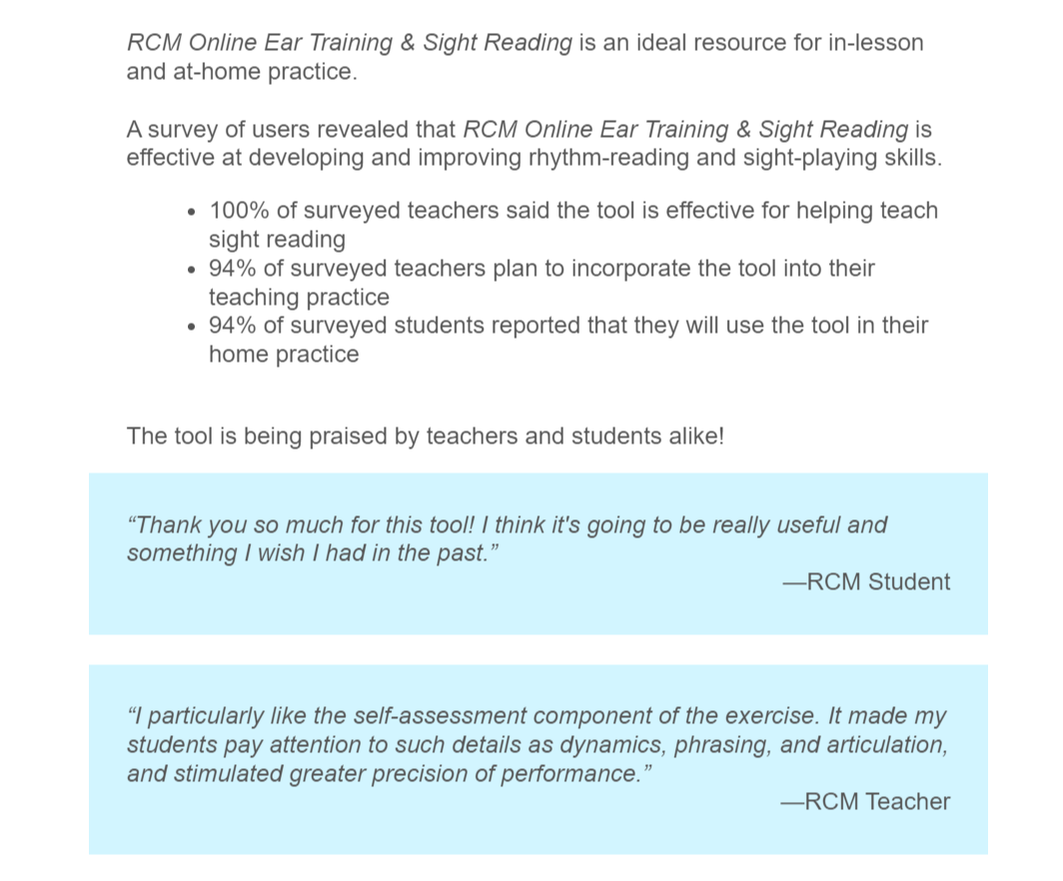

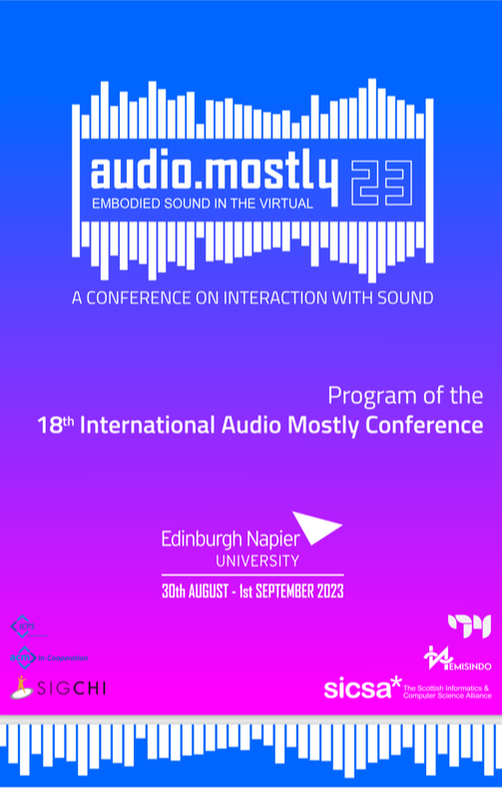
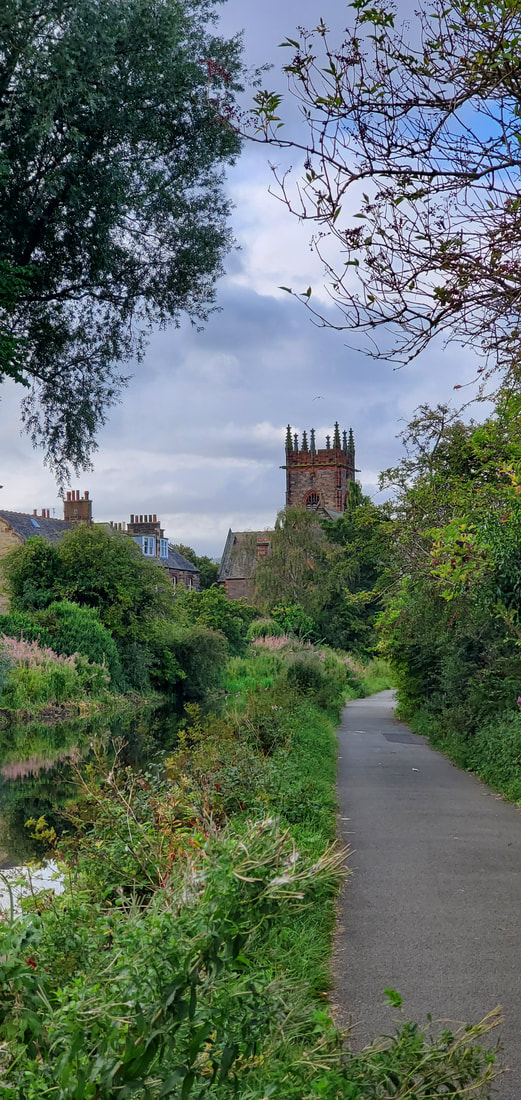
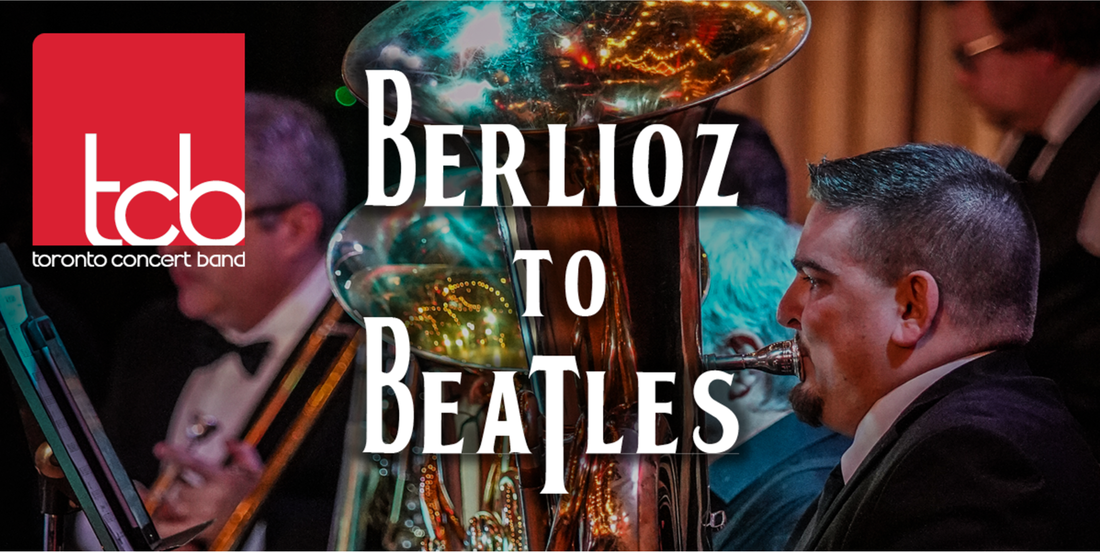
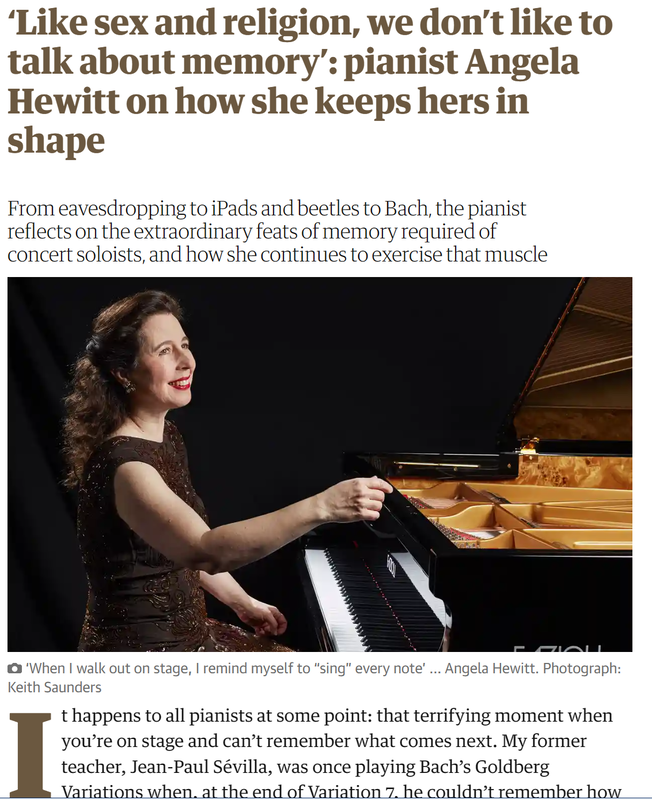
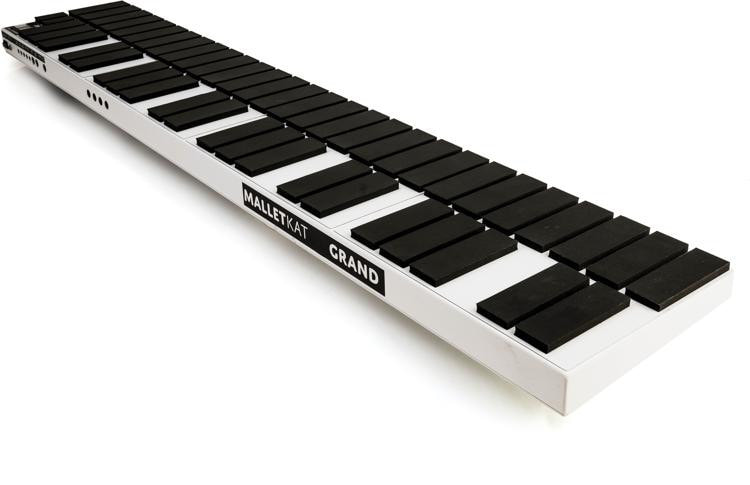
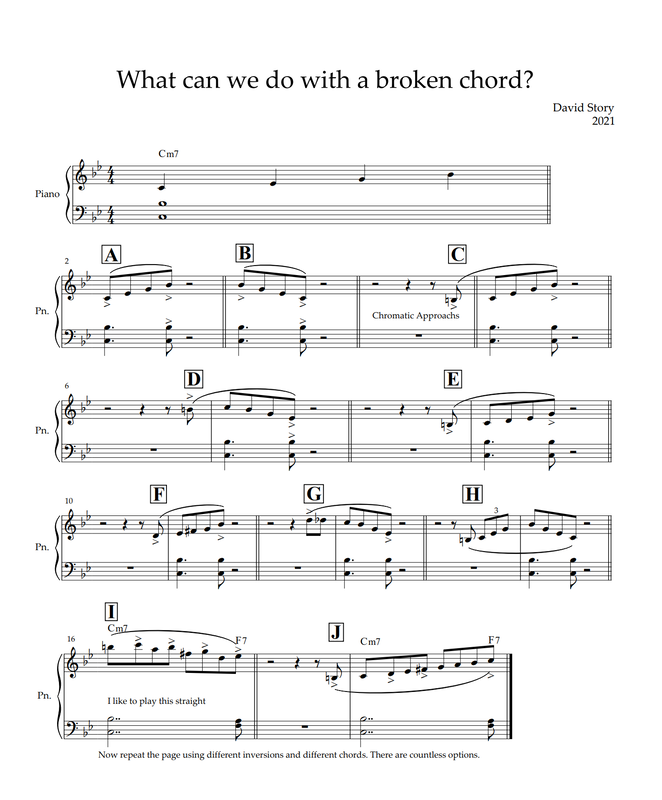

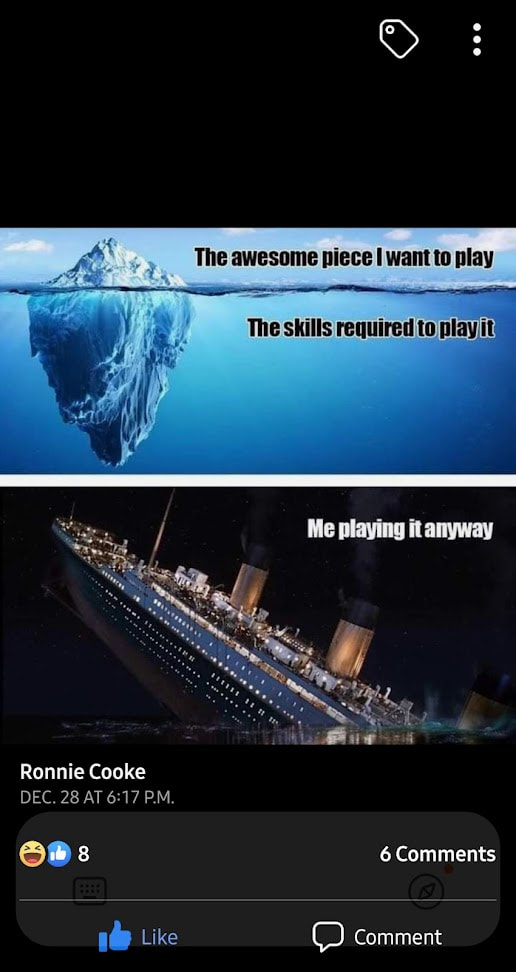
 RSS Feed
RSS Feed